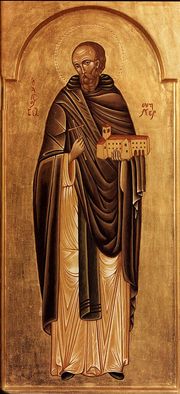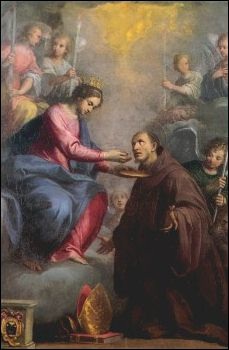
At the funeral of a certain nobleman he perceived in an open grave the disfigured corpse of a kinsman of his own who had been very comely in his lifetime, and he said to himself, I am what he was, and what he is I shall be. Straightway after the funeral he read the words of the Lord, If any man will come after me let him deny himself and take up his cross and follow me. Thereupon he withdrew into the desert to seek after greater perfection, and then gave himself up to watching, praying, and fasting, very often taking no food but uncooked herbs. In order, however, to cut himself off the more from men, he moved from one place to another, and at length came to Monte Fano, which is hard by Fabriano, but was itself then absolutely uninhabited. Then he built a church in honour of the holy Father Benedict, and founded the congregation of Sylvestrians, with a rule and dress which were revealed to him in a vision by the holy Patriarch himself.
Satan envied him, strove to trouble his monks by divers terrors, and made an hostile attack by night upon the gates of his monastery, but the man of God so overcame the assault of the enemy that his monks were the more confirmed in their Institute and recognised the holiness of their father. He shone with the spirit of prophecy and other gifts. These things he always preserved by the deepest lowliness, whereby he so stirred up against him the ill-will of the devil that that evil spirit cast him headlong down the stairs of his oratory, and went near to slay him, but he was restored to soundness by the helpful gift of the Virgin. This help he remembered with an unceasing singular love toward her until the last breath of his life, the which breath he resigned to God, famous for holiness and miracles, aged almost ninety years, upon the 26th day of November, in the year of salvation 1267. The Supreme Pontiff Leo XIII extended his Office and Mass to the universal Church.





